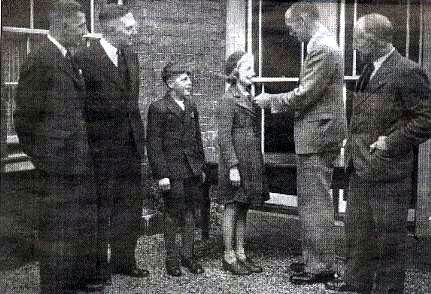|
Waste paper recycling
The concept of recycling waste has its origins in wartime when necessity meant that nothing that might be useful should be thrown away. In 1918, when the First World War was in progress, a county organiser for the collection of waste paper visited Bourne and a public notice was issued appealing for traders and householders to save waste paper and old metals. The Second World War of 1939-45 was a particularly busy period for such prudence and children were recruited to help all they could by carrying out door to door collections of salvageable material, especially paper. The drive to save and collect in Bourne was supervised by William Chivers, Chief Sanitary Officer for South Kesteven Rural District Council who was appointed Salvage Officer in 1939 and continued in the job until the war ended, heading a specially appointed committee. It was his idea to collect waste paper for recycling from the general public and among those methods he used were a series of visits to local schools where he organised competitions among pupils to see who could collect the most paper in the form of old books, magazines and newspapers. Prizes supplied by the Women's Voluntary Service (the WVS) were handed out to the winners and his campaign was such a success that during 1942 alone, over 200 tons of waste paper was collected in Bourne and the surrounding area, amounting to a cash value of £992, a small fortune in those days and a most valuable contribution to the war effort. The council's Salvage Committee was finally wound up in July 1946 when collections were taken over by refuse contractors. A review of its achievements revealed that altogether, 634 tons 7 cwt. 56 lb. of salvage had been collected and sold for £2,972 11s. 8d. The result in the last six months up to June 30th, however, had been very poor with only 4 tons 12 cwt. being collected, its sale realising £22 15s. 11d., a reflection perhaps of the public's relaxation of the past urgency to save waste following the war's end the previous year. Nevertheless, the committee decided at its last meeting that schools which had played such a big part in the drive were rewarded with shields going to those which topped the list for the amount collected per head of population, together with the runners up, namely Billingborough, Deeping St James, Corby Glen, Rippingale and Witham-on-the-Hill, while special medals were awarded to the council's salvage workers. There were also tributes to Mr Chivers for his work as Salvage Officer and the chairman of the committee, Councillor T E Peart, with letters of appreciation being sent to all workers who had helped with collections throughout the district. See also Rubbish
Go to: Main Index Villages Index
|
